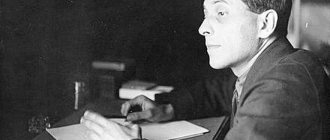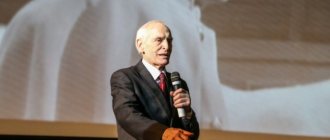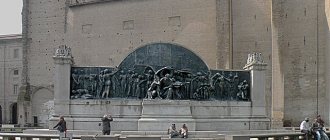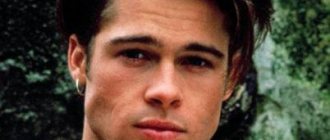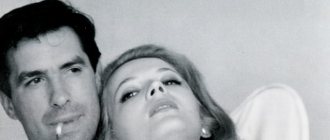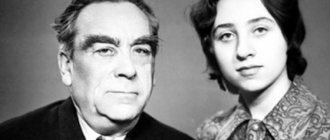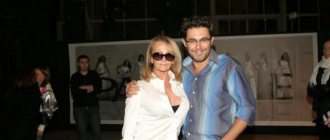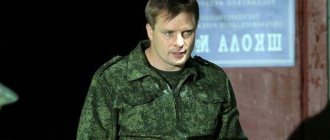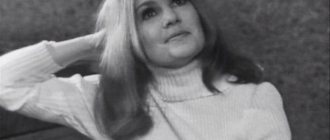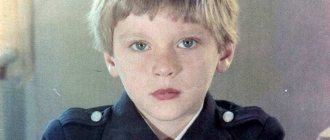Biography
Vladimir Yakovlevich Shainsky was born on December 12, 1925 in Kyiv into a Jewish family. Father - Yakov Borisovich Shainsky, chemical engineer. Mother - Ita Mendelevna Shainskaya, biologist.
Since 1936, he studied violin at the ten-year music school at the Kyiv Conservatory, but the outbreak of war interrupted his studies, and in 1941 the family was evacuated to Tashkent. Vladimir continued his musical education at the Tashkent Conservatory, where he studied until 1943, when he was drafted into the Red Army. He served in a communications regiment in Central Asia, where he began writing music.
After the war in 1945, Vladimir Shainsky entered the Tchaikovsky Moscow State Conservatory in the orchestra department. From 1949 to 1952 he worked in Leonid Utesov's orchestra. Then he taught violin class at a music school (1952-1954), and from 1954 to 1962 he worked as an orchestrator, composer, and musical director of various pop orchestras.
In 1962 he entered, and in 1965 he graduated from the composition department of the Baku Conservatory named after U. A. G. Gadzhibekov, where he studied in the class of People's Artist of the USSR K. A. Karaev.
Until 2000, he lived and worked in Moscow, then in Israel, and in 2004 he moved to the United States in San Diego, where he received a residence permit. For a long time I lived in two countries, in Russia and the USA. Since 2013, he has lived permanently in the United States. He had two citizenships - the Russian Federation and Israel.
Family[ | ]
- Father - Yakov Borisovich Shainsky, chemical engineer[18].
- Mother - Ita Mendelevna Shainskaya (01/01/1898 - 01/01/1971)[19], microbiologist, worked as a researcher at the Kyiv Institute of Microbiology and Epidemiology[20][7]; author of scientific works.
Was married three times[21]:
- First wife - Asya Bakhish-kyzy Sultanova (born 1923), composer.
- The second wife, Natalya Vasilievna Shainskaya (January 6, 1950 - May 9, 2020), died from COVID-19 (coronavirus) while working as a nurse. Son - Joseph Vladimirovich Shainsky (born October 21, 1971)[22], graduated from MIREA, works as a programmer. Granddaughter - Alisa Iosifovna Shainskaya (born September 26, 2011) in Moscow.
- Grandson - Mark Iosifovich Shainsky (born December 6, 2015) in Israel.
- Son - Vyacheslav Vladimirovich Shainsky (born June 15, 1987)[22], sound engineer, graduated from the Institute of Contemporary Art. Lives and works in Moscow.
Family
Father - Yakov Borisovich Shainsky - chemical engineer.
Mother - Ita Mendelevna Shainskaya (01/01/1898 - 01/01/1971) - biologist.
The first wife is Natalya Vasilyevna Shainskaya (born January 6, 1950).
- Son - Joseph Vladimirovich Shainsky (born October 21, 1971).
- Granddaughter - Alisa Iosifovna Shainskaya.
- Grandson - Mark Iosifovich Shainsky.
Second wife - Svetlana Vladimirovna Shainskaya (born May 25, 1966).
- Son - Vyacheslav Vladimirovich Shainsky (born June 15, 1987), sound engineer, graduated from the Institute of Contemporary Art. Lives and works in Moscow.
- Daughter - Anna Vladimirovna Shainskaya (born 1991), graduated from the University of California at Berkeley.
Shainsky's wife is 41 years younger than him
Despite the fact that the age difference between Svetlana and Vladimir is 41 years, the wife is incredibly jealous of her husband and tries to always be by his side, fearing that the loving Vladimir will find himself a younger wife. In public, the couple always tries to stay close, despite the fact that Svetlana is much taller than Vladimir. She is quite a striking woman, with a good figure and blond hair just below her shoulders.
Svetlana and Vladimir are married to two children, son Vyacheslav (born in 1987) and daughter Anna (born in 1991). The Shainsky family life is very stormy: according to both spouses, they often quarrel, but immediately make up. Svetlana says that as a person with a serious profession, it was difficult for her to get along with a musician, but what can’t you do for love! She said that for the first time after the wedding, Vladimir sharply stopped her when his wife turned on music on the radio or TV in the house for the background.
Creation
The composer's first works were a string quartet, written in 1963 while still at the conservatory, and a symphony, created in 1965. V. Ya. Shainsky is best known as the author of numerous works for children. Over the years of his creative activity, he composed an opera for children, “Three Against Marabuc” (1974), and several musicals:
- “Az, Buki, Lead” (1975, libretto and lyrics by Mikhail Plyatskovsky),
- “The Journey of Nils” (1984, based on the fairy tale by Selma Lagerlöf, poems by Robert Rozhdestvensky),
- "The Eighth Wonder of the World" (1985),
- "Elevator" (1987),
- “Gelsomino and the Pirates” (1988, libretto and poems by A. Gangov),
- “Across Fairy Tales and Continents” (1989),
- “Racket” (1993, libretto and lyrics by A. Gangov),
- “The Groom for the Dowry” (1994, libretto and poems by A. Gangov).
Vladimir Shainsky is the author of dozens of melodies from popular feature and animated films. Among them are the films “Aniskin and Fantomas”, “And Aniskin Again”, “Breakfast on the Grass”, “School Waltz”, “Finist - the Clear Falcon”, “While the Clock Strikes”, the documentary “Steps of History”, the cartoons “Cheburashka” , “Shapoklyak”, “Caterok”, “Little Raccoon”, “Shake! Hello!”, musical fairy tales “2 × 2 = 4”, “Cardboard Clock Square” and many others.
As the composer has repeatedly admitted, his melodies are inspired by klezmer, inheriting the klezmer tradition; in addition, the influence of the Viennese classical school is noticeable in the melodies and arrangements of his songs. He wrote music for a number of songs based on poems by Soviet Yiddish poets, in particular Joseph Kerler, Moishe Teif and Aron Vergelis.
The songs of Cheburashka, the crocodile Gena and the old woman Shapoklyak from the films of Roman Kachanov have become favorites for several generations of adults and children.
Popular songs
Vladimir Shainsky wrote more than 300 songs, many of which became popular (the authors of the words are indicated in brackets):
- “And in the Moscow region” (E. Uspensky) - Spanish. Maya Kristalinskaya, Igor Krutoy
- “And the forest stands mysterious” (V. Feldman) - Spanish. Lyudmila Zykina, Lyudmila Gurchenko
- “And I like him” (A. Zhigarev) - Spanish. Anna German, Edita Piekha
- “And I love” (V. Kharitonov) - Spanish. Vadim Mulerman, Eduard Khil
- “Adzhimushkay” (B. Dubrovin) - Spanish. Sergey Zakharov, Turetsky Choir
- “Oh, Natasha!” (L. Oshanin) - Spanish. Aida Vedishcheva, Valentina Tolkunova, Victor Rybin
- “Ledum” (I. Morozov) - Spanish. VIA "Gems", Verka Serduchka
- “White Wings” (V. Kharitonov) - Spanish. Valery Obodzinsky, VIA "Plamya", group "Dune", Anna German
- “White Birch” (L. Ovsyannikova) - Spanish. Lucky Kesoglu, Lev Leshchenko
- “Paper Dove” (R. Gubin) - Spanish. Vladimir Shainsky, Nina Savicheva, Buranovsky grandmothers
- “Tomorrow will be better than yesterday” (V. Alenin) - Spanish. Aida Vedishcheva, Grigory Leps
- “Merry March” (V. Kharitonov) - Spanish. Yuri Gulyaev, Elena Terleeva
- “Adults and Children” (M. Tanich) - Spanish. Irina Muravyova, Boris Moiseev
- “Depth” (Yu. Entin) - Spanish. Vera Vasilyeva, Mikhail Pugovkin and Vera Brezhneva
- “Ice” (M. Plyatskovsky) - Spanish. Vladimir Makarov, Masha Rasputina
- “Two Stars” (B. Dubrovin) - Spanish. Vladimir Shainsky, Igor Nikolaev
- “Detective” (M. Tanich) - Spanish. Tõnis Mägi, Karina Koks
- “Childhood” (A. Osipova) - Spanish. Vadim Mulerman, Aida Vedishcheva, Yuri Shatunov
- “The Iron Road” (M. Plyatskovsky) - Spanish. VIA "Plamya", Gennady Vetrov
- “Blackbirds” (S. Ostrovoy) - Spanish. Emil Gorovets, Anatoly Alexandrovich, Alla Pugacheva, Gennady Belov, VIA "Pesnyary", Yulia Savicheva
- “Friendship - Freundschaft” (V. Urin) - known in the past GDR
- “If we forget the war” (R. Rozhdestvensky) - Spanish. Joseph Kobzon, Vladimir Shainsky, Yuri Antonov
- “If you become a song” (M. Plyatskovsky) - Spanish. Emil Horovets, Nelly Boguslavskaya, Anita Tsoi
- “There is such a village” (M. Plyatskovsky) - Spanish. Vladimir Makarov, Disco Accident
- “Women’s hands” (R. Gamzatov) - Spanish. Lev Leshchenko, Andrey Gubin
- “Trains are coming along the BAM” (R. Rozhdestvensky) - Spanish. Joseph Kobzon, Oleg Gazmanov
- “A soldier is walking through the city” (M. Tanich) - Spanish. VIA "Flame"
- “How can I fall in love” (B. Bryansky) - Spanish. Alla Pugacheva, Irina Saltykova
- “When the snow melted” (M. Ryabinin) - Spanish. Lev Leshchenko, Sati Casanova
- “When the gardens bloomed” (M. Ryabinin) - Spanish. Anna German, Masha Rasputina
- “Golden Spikelet” (I. Shaferan) - Spanish. VIA “Flame”, “My leg cramped”
- “Lada” (M. Plyatskovsky) - Spanish. Vadim Mulerman, Murat Nasyrov
- “Quiet words of love” (B. Dubrovin) - Spanish. Anna German
- “We are starting KVN” (B. Salibov) - Spanish. Vladimir Shainsky, Olga Orlova
- “I’ll get off at the distant station” (M. Tanich) - Spanish. Gennady Belov, VIA "Plamya", Stas Kostyushkin, Egor Letov
- “The Bride” (M. Ryabinin) - Spanish. Anna German
- “Don’t cry, girl” (V. Kharitonov) - Spanish. Eduard Khil, Lev Leshchenko, Sergei Mikhalok
- “Childhood Sky” (R. Kazakova) - Spanish. Olga Zarubina, Mikhail Boyarsky and Andrei Razin
- “Why are you indifferent to me” (M. Matusovsky) - Spanish. Andrey Mironov, Yuri Puzyrev, “Potap and Nastya”
- “Wedding ring” (M. Ryabinin) - Spanish. VIA “Leisya, song”, Lyubov Uspenskaya, Jasmine
- “Dawn the Sorcerer” (M. Plyatskovsky) - Spanish. Gennady Belov, Valery Meladze
- “Parental home” (M. Ryabinin) - Spanish. Lev Leshchenko, Irina Lukyanova
- “Golden Fish” (M. Lvovsky) - Spanish. Evgeny Golovin, Vladimir Shainsky, Elena Vaenga
- “Rowan” (V. Kharitonov) - Spanish. Sofia Rotaru, group of Stas Namin and Oksana Pochepa
- “Capital of Komsomol cities” - (Felix Chuev) - Spanish. Lev Leshchenko, Nikolai Rastorguev
- “Herbs, herbs...” (I. Yushin) - Spanish. Gennady Belov, Yuri Shevchuk
- “You're late” (A. Zhigarev) - Spanish. Anna German
- “Corner of Russia” (E. Sheveleva) - Spanish. Valentina Tolkunova
- “Through two winters” (M. Plyatskovsky) - Spanish. Arayik Babajanyan, Yuri Bogatikov, VIA "Gems", Marina Khlebnikova
- “I remember everything, but you forget” (A. Zhigarev) - Spanish. Anna German “I’m alone with my mother” (V. Kharitonov) - Spanish. Larisa Mondrus
Dossier
Vladimir Yakovlevich Shainsky was born on December 12, 1925 in Kyiv.
Since 1936, he studied violin at the ten-year music school at the Kyiv Conservatory, but the outbreak of war interrupted his studies, and in 1941 the family was evacuated to Tashkent. Vladimir continued his musical education at the Tashkent Conservatory, where he studied until 1943, when he was drafted into the Red Army. He served in a communications regiment in Central Asia, where he began writing music.
After the war in 1945, Shainsky entered the Tchaikovsky Moscow State Conservatory in the orchestra department.
Since 1949, he worked for three years in Leonid Utesov's orchestra. Then he taught violin class at a music school (1952–1954), and from 1954 to 1962 he worked as an orchestrator, composer, and musical director of various pop orchestras.
In 1962 he entered, and in 1965 he graduated from the composition department of the Baku Conservatory named after U. A. G. Gadzhibekov, where he studied in the class of People's Artist of the USSR K. A. Karaev.
He lived and worked in Moscow until 2000, since 2000 he lived in Israel, and in 2004 he moved to the USA, where he received a residence permit. Has two citizenships - the Russian Federation and Israel.
Family
First wife - Natalya (born 1950)
Son - Joseph Shainsky.
Granddaughter - Alisa Shainskaya.
Second wife - Svetlana (born 1966)
Son - Vyacheslav Shainsky (born 1987), sound engineer, student at the Institute of Contemporary Art.
Daughter - Anna Shainskaya (born 1991), student at the University of California, Berkeley.
Vladimir Shainsky with his wife Svetlana. Photo: www.globallookpress.com
Creation
The composer's first works were a string quartet, written in 1963 while still at the conservatory, and a symphony, created in 1965. Shainsky is best known as the author of numerous works for children. Over the years of his creative activity, he composed an opera for children, “Three Against Marabuc” (1974), and several musicals:
- “Az, Buki, Lead” (1975, libretto and poems by M. S. Plyatskovsky ),
- “The Journey of Nils” (1984, based on the fairy tale by Selma Lagerlöf, poems by R. Rozhdestvensky ),
- "The Eighth Wonder of the World" (1985),
- "Elevator" (1987),
- “Gelsomino and the Pirates” (1988, libretto and lyrics by A. Gangov ),
- “Across Fairy Tales and Continents” (1989),
- “Racket” (1993, libretto and lyrics by A. Gangov),
- “The Groom for the Dowry” (1994, libretto and poems by A. Gangov).
Shainsky is the author of dozens of melodies from popular feature and animated films. Among them are the films “Aniskin and Fantomas”, “And Aniskin Again”, “Breakfast on the Grass”, “School Waltz”, “Finist - the Clear Falcon”, “While the Clock Strikes”, the documentary “Steps of History”, the cartoons “Cheburashka” , “Shapoklyak”, “Caterok”, “Little Raccoon”, “Shake! Hello!”, musical fairy tales “2 × 2 = 4”, “Cardboard Clock Square” and many others.
Famous songs
Shainsky wrote more than 300 songs:
· “And in the Moscow Region” (lyricist - E. Uspensky) - Spanish. Maya Kristalinskaya, Igor Krutoy
· “And the forest stands mysterious” (V. Feldman) - Spanish. Lyudmila Zykina, Lyudmila Gurchenko
· “And I like him” (A. Zhigarev) - Spanish. Anna German, Edita Piekha
· “And I love” (V. Kharitonov) - Spanish. Vadim Mulerman, Eduard Khil
· “Adzhimushkay” (B. Dubrovin) - Spanish. Sergey Zakharov, Turetsky Choir
· “Oh, Natasha!” (L. Oshanin) - Spanish. Aida Vedishcheva, Valentina Tolkunova, Victor Rybin
· “Ledum” (I. Morozov) - Spanish. VIA "Gems", Verka Serduchka
· “White Wings” (V. Kharitonov) - Spanish. Valery Obodzinsky, VIA "Plamya", group "Dune"
· “White Birch” (L. Ovsyannikova) - Spanish. Lucky Kesoglu, Lev Leshchenko
· “Paper Dove (R. Gubin) - Spanish. Vladimir Shainsky, Nina Savicheva, Buranovskie Babushki
· “Tomorrow will be better than yesterday” (V. Alenin) - Spanish. Aida Vedishcheva, Grigory Leps
· “Merry March” (V. Kharitonov) - Spanish. Yuri Gulyaev, Elena Terleeva
· “Adults and Children” (M. Tanich) - Spanish. Irina Muravyova, Boris Moiseev
· “Depth” (Yu. Entin) - Spanish. Vera Vasilyeva, Mikhail Pugovkin and Vera Brezhneva
· “Ice” (M. Plyatskovsky) - Spanish. Vladimir Makarov, Masha Rasputina
· “Two Stars” (B. Dubrovin) - Spanish. Vladimir Shainsky, Igor Nikolaev
· “Detective” (M. Tanich) - Spanish. Tõnis Mägi, Karina Koks
· “Childhood” (A. Osipova) - Spanish. Vadim Mulerman, Yuri Shatunov
· “The Iron Road” (M. Plyatskovsky) - Spanish. VIA "Plamya", Gennady Vetrov
· “Drozdy” (S. Ostrovoy) - Spanish. Alla Pugacheva, Gennady Belov, VIA “Pesnyary”, Yulia Savicheva
· “Friendship - Freundschaft” (V. Urin) - known in the past GDR [4]
· “If we forget the war” (R. Rozhdestvensky) - Spanish. Joseph Kobzon, Vladimir Shainsky, Yuri Antonov
· “If you become a song” (M. Plyatskovsky) - Spanish. Nelly Boguslavskaya, Anita Tsoi
· “There is such a village” (M. Plyatskovsky) - Spanish. Vladimir Makarov, Disco Accident
· “Women’s hands” (R. Gamzatov) - Spanish. Lev Leshchenko, Andrey Gubin
· “Trains are coming along the BAM” (R. Rozhdestvensky) - Spanish. Joseph Kobzon, Oleg Gazmanov
· “A soldier is walking through the city” (M. Tanich) - Spanish. VIA "Flame", Toto Cutunio
· “How could I fall in love” (B. Bryansky) - Spanish. Alla Pugacheva, Irina Saltykova
· “When the snow melted” (M. Ryabinin) - Spanish. Lev Leshchenko, Sati Casanova
· “When the gardens bloomed” (M. Ryabinin) - Spanish. Anna German, Masha Rasputina
· “Golden Spikelet” (I. Shaferan) - Spanish. VIA “Flame”, “My leg cramped”
· “Lada” (M. Plyatskovsky) - Spanish. Vadim Mulerman, Murat Nasyrov
· “We are starting KVN” (B. Salibov) - Spanish. Vladimir Shainsky, Olga Orlova
· “I’ll get off at the distant station” (M. Tanich) - Spanish. Gennady Belov, VIA "Plamya", Stas Kostyushkin
· “Don’t cry, girl” (V. Kharitonov) - Spanish. Eduard Khil, Lev Leshchenko, Sergei Mikhalok
· “Childhood Sky” (R. Kazakova) - Spanish. Olga Zarubina, Mikhail Boyarsky and Andrei Razin
· “Why are you indifferent to me” (M. Matusovsky) - Spanish. Andrey Mironov, Yuri Puzyrev, “Potap and Nastya”
· “Wedding Ring” (M. Ryabinin) - Spanish. VIA “Leisya, song”, Lyubov Uspenskaya, Jasmine
· “Dawn the Sorcerer” (M. Plyatskovsky) - Spanish. Gennady Belov, Valery Meladze
· “Parental home” (M. Ryabinin) - Spanish. Lev Leshchenko, Irina Lukyanova
· “Golden Fish” (M. Lvovsky) - Spanish. Evgeny Golovin, Vladimir Shainsky, Elena Vaenga
· “Rowan” (V. Kharitonov) - Spanish. Sofia Rotaru, group of Stas Namin and Oksana Pochepa
· “Capital of Komsomol cities” - (Felix Chuev) - Spanish. Lev Leshchenko, Nikolai Rastorguev
· “Herbs, herbs...” (I. Yushin) - Spanish. Gennady Belov, Yuri Shevchuk
· “Through two winters” (M. Plyatskovsky) - Spanish. Arayik Babajanyan, Yuri Bogatikov, VIA "Gems", Marina Khlebnikova
In memory of Vladimir Shainsky
Soviet composer Vladimir Shainsky gives an autograph to the laureate of the Soviet Song Festival in Zielona Gora, 1977. RIA Novosti / Boris Babanov
Honored Artist of the RSFSR, laureate of the Lenin Komsomol Prize in 1980, laureate of the USSR State Prize in 1981, composer Vladimir Shainsky (center) among children. RIA Novosti / S. Zhabin
Composer Vladimir Yakovlevich Shainsky was awarded the Order of the Badge of Honor in 2002 for outstanding services in the field of culture. RIA Novosti / Dmitry Korobeinikov
Russian President Vladimir Putin (left) during the awarding of composer Vladimir Shainsky (right) with the Order of Merit for the Fatherland, IV degree, in the Catherine Hall of the Kremlin, 2005. RIA Novosti / Vladimir Rodionov
Composer Vladimir Shainsky speaks with journalists at the 10th anniversary concert of the children's group "Fidgets" - "Adults and Children", dedicated to Children's Day. RIA Novosti / Vitaly Belousov
Vladimir Shainsky with his wife Svetlana, 2005. www.russianlook.com / Natalya Loginova
Vladimir Shainsky with his son Slava, 2005. www.russianlook.com / Natalya Loginova
Vladimir Shainsky with his son Slava, 2005. www.russianlook.com / Natalya Loginova
Vladimir Shainsky with his wife Svetlana at the Golden Gramophone award in 2011. www.russianlook.com / Anatoly Lomohov
Composer Vladimir Shainsky and musician Levon Oganezov (from left to right) at the “Cocktail from the Producer” event, held as part of the Golden Gramophone award ceremony at the State Kremlin Palace, 2011. RIA Novosti / Valery Levitin
Songs for children
- “ABVGDeyka” (E. Uspensky) - performed by VK “Accord”, “Fidgets”
- “Antoshka” (Yu. Entin) - performed by Marina Lukach
- “White Ships” (L. Yakhnin) - performed by Klara Rumyanova
- “There are many fairy tales in the world” (Yu. Entin) - performed by Klara Rumyanova
- “Merry Fugue” (vocalise) - performed by the Big Children's Choir of the All-Union Radio and Central Television
- “Merry Carousel” (Yu. Entin) - performed by Klara Rumyanova
- “It's fun to walk together” (M. Matusovsky) - performed by the Big Children's Choir of the All-Union Radio and Central Television (soloist - Dima Golov)
- “The Blue Car” (E. Uspensky) - performed by Vladimir Ferapontov, the Big Children’s Choir of the All-Union Radio and Central Television (soloist - Seryozha Paramonov)
- “Twice two is four” (M. Plyatskovsky) - performed by Eduard Khil, the Big Children's Choir of the All-Union Radio and Central Television (soloist - Misha Dulsky)
- “If there were no schools” (Yu. Entin) - performed by Irina Muravyova
- “The Game” (R. Rozhdestvensky) - performed by the Big Children's Choir of the All-Union Radio and Central Television (soloist - Dima Viktorov)
- “When my friends are with me” (M. Tanich) - performed by the Big Children’s Choir of the All-Union Radio and Central Television (soloist Dima Golov), “Fidgets”
- “Cruiser “Aurora”” (M. Matusovsky) - performed by Marina Vinogradova and the male choir, the Big Children’s Choir of the All-Union Radio and Central Television (soloist Vitalik Nikolaev)
- “Grasshopper” (N. Nosov) - performed by the junior group of the Big Children's Choir (soloist - Andrey Orekhov)
- “Catch crocodiles” (M. Tanich)
- “Our Mother” (V. Popkov)
- “Not sung to the birds” (M. Plyatskovsky) - performed by Oleg Popov
- “Tall Tales” (Yu. Entin) - performed by Vladimir Vinokur and the children’s choir “Spring”
- “Clouds” (S. Kozlov) - performed by Klara Rumyanova
- “The Living Doll” (S. Alikhanov and A. Zhigarev) - performed by Ekaterina Surzhikova, Irina Uvarova, Marylya Rodovich, Natasha Koroleva
- “First-grader” (Yu. Entin) - performed by the Big Children's Choir of the All-Union Radio and Central Television (soloists - Olya Korolkova and Sasha Fedorko)
- “Song of the Crocodile Gena” (A. Timofeevsky) - performed by Vladimir Ferapontov, Big Children’s Choir of the All-Union Radio and Central Television (soloist - Seryozha Paramonov)
- “Song of the Baby Mammoth” (D. Nepomnyashchaya) - performed by Klara Rumyanova
- “Song about repairs” (M. Plyatskovsky)
- “Song about walruses” (I. Shaferan)
- “Red-tailed Song” (M. Plyatskovsky) - performed by Alla Pugacheva
- “Song of the Builders” (E. Uspensky)
- “Cheburashka’s Song” (E. Uspensky) - performed by Klara Rumyanova
- “Song Shapoklyak” (E. Uspensky) - performed by Irina Mizing
- “The Beaver Song” (Yu. Entin)
- “Song about Volodya Dubinin” (N. Olev) - performed by the Big Children's Choir of the All-Union Radio and Central Television (soloist - Seryozha Paramonov)
- “Song about the Circus” (M. Plyatskovsky) - performed by Oleg Popov
- “Song about Dad” (M. Tanich) - performed by the Big Children's Choir of the All-Union Radio and Central Television (soloist - Dima Viktorov
- “Pioneers-Pioneers” (M. Plyatskovsky) - performed by the Big Children's Choir of the All-Union Radio and Central Television
- “In secret to the whole world” (M. Tanich) - performed by the Big Children's Choir of the All-Union Radio and Central Television (soloist - Dima Viktorov)
- “The Dog is Missing” (A. Lamm) - performed by Lyudmila Gurchenko and Lena Mogucheva, Big Children's Choir of the All-Union Radio and Central Television (soloist - Lena Mogucheva)
- “Baby Monitor” (E. Uspensky) - performed by Alexander Livshits and Alexander Levenbuk
- “Dawn the Sorcerer” (M. Plyatskovsky) - performed by Gennady Belov, VIA “Plamya”, Big Children’s Choir of the All-Union Radio and Central Television (soloist - Marina Samyshkina)
- “Smile” (M. Plyatskovsky) - performed by Klara Rumyanova, Big Children’s Choir of the All-Union Radio and Central Television (soloist Seryozha Paramonov)
- “Photo card of “Artek”” (M. Plyatskovsky)
- “What they teach at school” (M. Plyatskovsky) - performed by Eduard Khil, the Big Children's Choir of the All-Union Radio and Central Television (soloist - Misha Dulsky)
- “Chunga-Changa” (Yu. Entin) - performed by Aida Vedishcheva and Anatoly Gorokhov
Shainsky Vladimir Yakovlevich
Shainsky worked in various musical genres. The composer's first works were a string quartet, written in 1963 while still at the conservatory, and a symphony, created in 1965. Later he composed an opera for children, “Three Against Marabuc” (1974), and several musicals:
“Az, Buki, Vedi” (1975, libretto and lyrics by Mikhail Plyatskovsky), “Nils’ Journey” (1984, based on the fairy tale by Selma Lagerlöf, lyrics by Robert Rozhdestvensky), “The Eighth Wonder of the World” (1985), “Elevator” (1987), “Gelsomino and the Pirates” (1988, libretto and lyrics by A. Gangov), “Across Fairy Tales and Continents” (1989), “Racket” (1993, libretto and lyrics by A. Gangov), “Groom for the Dowry” (1994, libretto and poems by A. Gangov).
He wrote music for a number of songs based on poems by Soviet Yiddish poets, in particular Joseph Kerler, Moishe Teif and Aron Vergelis. As the composer admitted, many of his melodies are inspired by klezmer. In addition, the influence of the Viennese classical school is noticeable in the melodies and arrangements of his songs.
Shainsky’s greatest fame came from the melodies he created for popular feature and animated films. Among them are the films “Aniskin and Fantomas”, “And Aniskin Again”, “Breakfast on the Grass”, “School Waltz”, “Finist - the Clear Falcon”, “While the Clock Strikes”, the documentary “Steps of History”, the cartoons “Cheburashka” , “Shapoklyak”, “Caterok”, “Little Raccoon”, “Shake! Hello!”, musical fairy tales “2 × 2 = 4”, “Cardboard Clock Square” and many others. The songs of Cheburashka, the crocodile Gena and the old woman Shapoklyak from the films of Roman Kachanov have become favorites for several generations of adults and children.
Famous songs
“And in the Moscow region” (E. Uspensky) - Spanish. Maya Kristalinskaya, Igor Krutoy “And the forest stands mysterious” (V. Feldman) - Spanish. Lyudmila Zykina, Lyudmila Gurchenko, Galina Nenasheva “And I like him” (A. Zhigarev) - Spanish. Anna German, Edita Piekha, Yulia Mikhalchik, Marina Devyatova “And I love” (V. Kharitonov) - Spanish. Vadim Mulerman, Eduard Khil “Adzhimushkay” (B. Dubrovin) - Spanish. Sergey Zakharov, Turetsky Choir “Ah, Natasha!” (L. Oshanin) - Spanish. Aida Vedishcheva, Valentina Tolkunova, Viktor Rybin “Ledum” (I. Morozov) - Spanish. VIA “Gems”, Tamara Miansarova, Verka Serduchka “White Wings” (V. Kharitonov) - Spanish. Valery Obodzinsky, VIA "Plamya", Sergey Kochemazov, Joseph Kobzon, Leonid Smetannikov, Mikhail Inozemtsev, Mikhail Poplavsky, Valery Durandin, group "Dune", Anna German "White Birch" (L. Ovsyannikova) - Spanish. Lucky Kesoglu, Lev Leshchenko “Paper Dove” (R. Gubin) - Spanish. Vladimir Shainsky, Nina Savicheva, Buranovsky grandmothers “Tomorrow will be better than yesterday” (V. Alenin) - Spanish. Maria Pakhomenko, Grigory Leps “Merry March” (V. Kharitonov) - Spanish. Yuri Gulyaev, Eduard Khil, Elena Terleeva “Adults and Children” (M. Tanich) - Spanish. Irina Muravyova, “Fidgets”, Boris Moiseev “Depth” (Yu. Entin) - Spanish. Vera Vasilyeva and Mikhail Pugovkin “Ice” (M. Plyatskovsky) - Spanish. Lyudmila Zykina, Vladimir Makarov, Masha Rasputina “Two Stars” (B. Dubrovin) - Spanish. Vladimir Shainsky, Nikolai Solovyov “Detective” (M. Tanich) - Spanish. Tõnis Mägi, Karina Koks “Childhood” (A. Osipova) - Spanish. Nina Brodskaya, Vadim Mulerman, Aida Vedishcheva “The Iron Road” (M. Plyatskovsky) - Spanish. VIA “Flame”, Gennady Vetrov “Drozdy” (S. Ostrovoy) - Spanish. Emil Gorovets, Anatoly Alexandrovich, Gennady Belov, VIA “Pesnyary”, Joseph Kobzon, Alla Pugacheva, “Gaya” Quartet, Lucky Kesoglu, Gennady Kamenny “Friendship - Freundschaft” (V. Urin) - Spanish. VIA “Gems”, was popular in the GDR “If we forget the war” (R. Rozhdestvensky) - Spanish. Joseph Kobzon, Vladimir Shainsky, Yuri Antonov “If you become a song” (M. Plyatskovsky) - Spanish. Emil Horovets, Nelli Boguslavskaya, Anita Tsoi “There is such a village” (M. Plyatskovsky) - Spanish. Vladimir Makarov, Disco Accident “Women’s Hands” (R. Gamzatov) - Spanish. Lev Leshchenko, Andrey Gubin “Trains are moving along the BAM” (R. Rozhdestvensky) - Spanish. Joseph Kobzon, Oleg Gazmanov “A soldier is walking through the city” (M. Tanich) - Spanish. VIA “Flame”, Lev Leshchenko, “Brilliant”, Alexey Goman “How could I fall in love” (B. Bryansky) - Spanish. Aida Vedishcheva, Alla Pugacheva, Irina Saltykova, Lili Ivanova “When the snow melted” (M. Ryabinin) - Spanish. Lev Leshchenko, Sati Casanova “When the gardens bloomed” (M. Ryabinin) - Spanish. Anna German, Lada Dance, Anna Reznikova, Tatyana Bulanova, Zara, Galina Nevara, Yu. July (in Chuvash language), Maxim Chigintsev (guitar) “Golden Spikelet” (I. Shaferan) - Spanish. VIA “Flame”, “The Leg Crashed” “Lada” (M. Plyatskovsky) - Spanish. Vadim Mulerman, Murat Nasyrov, Eduard Khil “Quiet words of love” (B. Dubrovin) - Spanish. Anna German, Muslim Magomaev, Elena Nikitina, Galina Uletova, Galina Nevara, Veronica Pegasy, Irina Yaskovich “We are starting KVN” (B. Salibov) - Spanish. Vladimir Shainsky, Olga Orlova “I’ll get off at the distant station” (M. Tanich) - Spanish. Gennady Belov, VIA “Flame”, “Gems”, “Civil Defense”, Stas Kostyushkin “Bride” (M. Ryabinin) - Spanish. Anna German, Maria Pakhomenko with daughter Natalya “Don’t cry, girl” (V. Kharitonov) - Spanish. Eduard Khil, Lev Leshchenko, Joseph Kobzon, Sergei Mikhalok, Alexandrov Choir “Childhood Sky” (R. Kazakova) - Spanish. Olga Zarubina, Mikhail Boyarsky and Andrei Razin “Why are you indifferent to me” (M. Matusovsky) - Spanish. Andrey Mironov, Yuri Puzyrev “Wedding Ring” (M. Ryabinin) - Spanish. VIA “Leisya, song”, “Gems”, Lyubov Uspenskaya, Jasmine “Dawn the Sorcerer” (M. Plyatskovsky) - Spanish. Gennady Belov, Valery Meladze, “Flame”, Big Children’s Choir of the All-Union Radio and Central Television “Parents’ House” (M. Ryabinin) - Spanish. Lev Leshchenko, Irina Lukyanova, Oksana Bogoslovskaya, Irina Yaskovich “Golden Fish” (M. Lvovsky) - Spanish. Evgeny Golovin, Vladimir Shainsky, Elena Vaenga “Rowan” (V. Kharitonov) - Spanish. Sofia Rotaru, group of Stas Namin and Oksana Pochepa “Funny Boy” (V. Alenin) - Spanish. Aida Vedishcheva “Capital of Komsomol cities” (F. Chuev) - Spanish. Lev Leshchenko, Nikolai Rastorguev “Herbs, herbs...” (I. Yushin) - Spanish. Gennady Belov, Yuri Shevchuk “You’re late” (A. Zhigarev) - Spanish. Anna German “Corner of Russia” (E. Sheveleva) - Spanish. Valentina Tolkunova, “Songs”, “Gems” “Gypsy Choir” (I. Reznik) - Spanish. Alla Pugacheva “Through two winters” (M. Plyatskovsky) - Spanish. Araik Babajanyan, Yuri Bogatikov, VIA “Gems”, “Leisya, song”, Marina Khlebnikova “Black Coffee” (A. Alshutov) - Spanish. Aida Vedishcheva “I remember everything, but you forget” (A. Zhigarev) - Spanish. Anna German “I’m alone with my mother” (V. Kharitonov) - Spanish. Larisa Mondrus
Songs for children
"ABVGDeyka" (E. Uspensky) - performed by VK "Accord", "Fidgets" "Antoshka" (Yu. Entin) - performed by Maria Lukach, Big Children's Choir of the All-Union Radio and Central Television (soloist Sergei Paramonov) "White Ships" (L Yakhnin) - performed by Klara Rumyanova "There are many fairy tales in the world" (Yu. Entin) - performed by Klara Rumyanova "Merry Fugue" (vocalise) - performed by the Big Children's Choir of the All-Union Radio and Central Television "Merry Carousel" (Yu. Entin) - performed Clara Rumyanova “It's fun to walk together” (M. Matusovsky) - performed by the Big Children's Choir of the All-Union Radio and Central Television (soloist - Dima Golov) “The Blue Car” (E. Uspensky) - performed by Vladimir Ferapontov, Big Children's Choir of the All-Union Radio and Central Television (soloist Sergei Paramonov) “Twice two is four” (M. Plyatskovsky) - performed by Eduard Khil, the Big Children’s Choir of the All-Union Radio and Central Television (soloist - Misha Dulsky) “If there were no schools” (Yu. Entin) - performed by Irina Muravyov’s “Game” (R. Rozhdestvensky) - performed by the Big Children’s Choir of the All-Union Radio and Central Television (soloist - Dima Viktorov) “When my friends are with me” (M. Tanich) - performed by the Big Children's Choir of the All-Union Radio and Central Television (soloist Dima Golov), "Fidgets", Lev Barashkov "Cruiser "Aurora" (M. Matusovsky) - performed by Marina Vinogradova and the male choir, Big Children's Choir of the All-Union Radio and Central television (soloist Vitalik Nikolaev) Alexandrov Choir (soloist Evgeny Belyaev), Eduard Khil "Grasshopper" (N. Nosov) - performed by the junior group of the Big Children's Choir (soloist - Andrey Orekhov), Klara Rumyanova "Catch the Crocodiles" (M. Tanich) - performed by Igor Sklyar “Our Mother” (V. Popkov) “Not sung to the birds” (M. Plyatskovsky) - performed by Oleg Popov “Tall Tales” (Yu. Entin) - performed by Vladimir Vinokur and the children’s choir “Spring”, Vladimir Shainsky and the children’s choir performed by the Radchenko sisters “Clouds - white-maned horses” (S. Kozlov) - performed by Klara Rumyanova “Living doll” (S. Alikhanov and A. Zhigarev) - performed by Ekaterina Surzhikova, Irina Uvarova, Marylya Rodovich, Natasha Koroleva “First-grader” Yu . Entin) - performed by the Big Children's Choir of the All-Union Radio and Central Television (soloists - Olya Korolkova and Sasha Fedorko) "Song of the Crocodile Gena" (A. Timofeevsky) - performed by Vladimir Ferapontov, the Big Children's Choir of the All-Union Radio and Central Television (soloist - Seryozha Paramonov) "Song of a Baby Mammoth" (D. Nepomnyashchaya) - performed by Klara Rumyanova "Song about Repairs" (M. Plyatskovsky) "Song about Walruses" ( I. Shaferan) “Song of the Red Tail” (M. Plyatskovsky) - performed by Alla Pugacheva “Song of the Builders” (E. Uspensky) Song of the Donkey (E. Lemekhova) - performed by T. Veselkina. Song of the Butterfly (E. Lemekhova) - performed by E. Bledans. Song of the Crocodile (E. Lemekhova) - performed by A. Nikulin. Mother's Song (E. Lemekhova) - performed by I. Zaitseva. Song of the Badger (E. Lemekhova) - performed by V. Badov. Song of the Caterpillar (E. Lemekhova) - V. Pierre-Marie. “Song of Cheburashka” (E. Uspensky) - performed by Klara Rumyanova “Song of Shapoklyak” (E. Uspensky) - performed by Mazing, Irina Evgenievna “Song of the Beavers” (Yu. Entin) “Song about Volodya Dubinin” (N. Olev) - performed Big Children's Choir of the All-Union Radio and Central Television (soloist - Seryozha Paramonov) "Song about the Circus" (M. Plyatskovsky) - performed by Oleg Popov "Song about Dad" (M. Tanich) - performed by the Big Children's Choir of the All-Union Radio and Central Television (soloist - Dima Viktorov) “Pioneers-pioneers” (M. Plyatskovsky) - performed by the Big Children's Choir of the All-Union Radio and Central Television "In secret to the whole world" (M. Tanich) - performed by the Big Children's Choir of the All-Union Radio and Central Television (soloist - Dima Viktorov ) “The Dog is Missing” (A. Lamm) - performed by Lyudmila Gurchenko and Lena Mogucheva, the Big Children’s Choir of the All-Union Radio and Central Television (soloist - Lena Mogucheva) “Baby Monitor” (E. Uspensky) - performed by Alexander Livshits and Alexander Levenbuk “Dawn” sorcerer" (M. Plyatskovsky) - performed by Gennady Belov, VIA "Plamya", Big Children's Choir of the All-Union Radio and Central Television (soloist - Marina Samyshkina) "Sesame Street" (Yu. Entin) “Smile” (M. Plyatskovsky) - performed by Klara Rumyanova, Big Children’s Choir of the All-Union Radio and Central Television (soloist Seryozha Paramonov) “Photo card of Artek” (M. Plyatskovsky) “What they teach at school” (M. Plyatskovsky) - performed by Eduard Khil, the Big Children's Choir of the All-Union Radio and Central Television (soloist - Misha Dulsky) "Chunga-Changa" (Yu. Entin) - performed by Aida Vedishcheva and Anatoly Gorokhov
Discography
Giant discs (LP) released by the All-Union record company "Melodiya":
1975 - “Vladimir Shainsky. Songs"
1978 - “V. Shainsky. Everyone, everyone, everyone... Songs for children"
1982 - “Songs of my soul. Vladimir Shainsky"
1985 - “Vladimir Shainsky. Az, Buki, Vedi... Musical comedy"
Bibliography
Song collections
Shainsky V. There will be a song. - M.: Soviet Composer, 1981. - 72 p. — 50,000 copies. Shainsky V. Merry carousel. - M.: ABF, 1995. - 63 p. Shainsky V. Selected songs. - M.: Soviet Composer, 1985. - 168 p. — 70,000 copies. Shainsky V. Songs. - M.: Soviet Composer, 1977. - 80 p. — 31,000 copies. Shainsky V. Songs for children. - M.: Muzyka, 1984. - 64 p. — 25,000 copies. Shainsky V. Whose songs do you sing. - M.: Muzyka, 1978. - 72 p. — 25,000 copies.
Filmography
Composer
1969-Antoshka 1970-Baby 1970-Bobra follow the trail of 1971-Cheburashka 1971-1973-Adventures of Dunno and his friends (animated series) 1972-Mom 1973-Aurora 1974-Aniskin and Fantomas 1974-Finist-Yasny Sokol 1974-Shapoklyak (cartoon) 1974 - Little Raccoon 1975 - Poacher Hunter 1976 - While the Clock Strikes 1976 - In Secret to the Whole World 1976 - Spring Call 1976 - Steps of History (documentary) 1976 - 38 Parrots 1977 - Grandma Boa Constrictor 1977 - How to Treat a Boa Constrictor 1977 - Where the Baby Elephant Goes 1978 - Hello Monkey 1978 - And again Aniskin 1978 - School Waltz 1978 - Schedule for the day after tomorrow 1979 - Breakfast on the grass 1979 - The amazing adventures of Denis Korablev 1980 - Shake! Hello! (cartoon) 1981 - One morning (cartoon) 1981 - Mom for a baby mammoth (cartoon) 1982 - Far, far in the south (cartoon) 1982 - 4:0 in favor of Tanya 1983 - Cheburashka goes to school (cartoon) 1983 - Morning without marks 1985 - Give us men! 1985 - Great Closing 1985 - Attention! All posts... 1986 - Miracles of technology (cartoon) 1986 - Malicious Sunday 2000 - What is missing in the world (cartoon) 2001 - Dora-dora-tomato Musical fairy tale "2x2=4" 2012 - Anna German. The Secret of the White Angel (author of the musical basis of the final theme (song “When the Gardens Bloomed”) 2013 - Cheburashka (cartoon)
Actor
1995 Ice Cream Man Ice cream seller (credited as Clint Howard) 1999 Eight and a half dollars Lesik from Los Angeles 2000 DMB veteran general 2001 Kyshkin House veteran general
Filmography (composer)
1969 - Antoshka 1970 - Baby 1970 - Bobra follow the trail of 1971 - Cheburashka 1971-1973 - adventures of Dunno and his friends (animated series) 1972 - Mom 1973 - Aurora 1974 - Aniskin and Fantomas 1974 - Finist - Yasny Sokol 1974 - Shapoklyak (cartoon) 1974 - Little Raccoon 1975 - Poacher Hunter 1976 - While the clock is striking 1976 - In secret to the whole world 1976 - Spring call 1976 - Steps of history (documentary) 1976 - 38 parrots 1977 - Grandmother Boa 1977 - How to treat a Boa 1977 - Where the Baby Elephant is going 1978 - Hello Monkey 1978 - And again Aniskin 1978 - School Waltz 1978 - Schedule for the day after tomorrow 1979 - Breakfast on the grass 1979 - The amazing adventures of Denis Korablev 1980 - Shake! Hello! (cartoon) 1981 - One morning (cartoon) 1981 - Mom for a baby mammoth (cartoon) 1982 - Far, far in the south (cartoon) 1982 - 4:0 in favor of Tanya 1983 - Cheburashka goes to school (cartoon) 1985 - Give us men ! 1985 - The Great Closing 1986 - Miracles of Technology (cartoon) 1986 - Malicious Sunday 2000 - What is missing in the world (cartoon) 2001 - Dora-dora-tomato Musical fairy tale “2x2=4” 2012 - Anna German. The Secret of the White Angel (author of the musical basis of the final theme (song “When the Gardens Bloomed”) 2013 - Cheburashka (cartoon)
Music for cartoons
And how many famous children's songs the composer wrote for cartoons! It was this area that brought the composer the greatest popularity. After all, the funny images in the music are complemented by truly warm, kind Soviet animation.
The career of a children's composer began with the playful song "Antoshka". But the composer composed it in just 5 minutes! One day, Vladimir Yakovlevich came to the Melodiya recording studio in the symphonic music department, dreaming of becoming a classical composer. He demanded the director of the studio, so much so that the head of the department complained about him to Yuri Entin, who was in charge of the children's editorial office. As a result, Shainsky's dream was not destined to come true. The meeting with Entin became historic; the composer quickly sang the melody of a perky song to his poems.
The musical intro of “Merry Carousel” is also the work of Vladimir Yakovlevich.
The story about Cheburashka and the crocodile Gena is one of the most famous animations of the Soviet period, the music for which was written by the children's composer Shainsky. The biography of this wizard in music includes many other famous cartoons, which we often recognize even from his songs.
Shainsky also wrote “The Baby Mammoth’s Song,” a touching story about how a baby mammoth dreams of reaching its mother. And how much dreaminess, how much enthusiasm there is in the song “Clouds”! Listen to it, and you want to join three friends on their journey along the road with the clouds.
Can you use music to paint an amazing tropical island with its own interesting culture? And Vladimir Yakovlevich can do this! Yes, the music for the song “Chunga-Changa” also belongs to the pen of this wonderful composer.
And you just can’t help but smile after the song to the cartoon “Little Raccoon.” The resilient, cheerful composer himself smiles sincerely and cheerfully in almost every photograph. After all, a composer’s work is always influenced by his own character, and Vladimir Shainsky, who writes such songs, simply cannot help but be a cheerful person.
Not only songs were created for cartoons, but also all the musical accompaniment in general. The list of paintings is colossal:
- 1969 - “Antoshka”.
- 1970 - “Katerok”.
- 1970 - “Beavers are on the trail.”
- 1971 - “Cheburashka”.
- 1971-1973 - “The Adventures of Dunno and His Friends.”
- 1972 - “Mother”.
- 1973 - “Aurora”.
- 1974 - “Shapoklyak”.
- 1974 - “Little Raccoon.”
- 1976 - “38 Parrots”.
- 1977 - “Grandma Boa Constrictor.”
- 1977 - “How to treat a boa constrictor.”
- 1977 - “Where the Baby Elephant Goes.”
- 1978 - “Hello Monkey.”
- 1980 - “Shake!” Hello!"
- 1981 - “One Morning.”
- 1981 - “Mother for a baby mammoth.”
- 1982 - “Far, Far South.”
- 1986 - “Miracles of Technology.”
- 2000 - “What is missing in the world.”
Maybe we don’t always pay attention to the music that’s playing in the background. But we’ll definitely pay attention if it’s suddenly missing.
Awards and titles
- Order of Merit for the Fatherland, IV degree (December 12, 2005) - for his great contribution to the development of Russian musical art and many years of creative activity.
- Order of Honor (October 11, 2001) - for many years of fruitful activity in the field of culture and art, great contribution to strengthening friendship and cooperation between peoples.
- Order of Friendship (December 28, 1995) - for services to the state, many years of fruitful activity in the field of culture and art.
- Medal “For Labor Valor” (November 14, 1980) - for great work in preparing and holding the Games of the XXII Olympiad
- Medal "For victory over Germany in the Great Patriotic War of 1941-1945" (1945)
- Jubilee medal "Thirty years of Victory in the Great Patriotic War 1941-1945" (1975)
- Badge “For services to Polish culture” (Poland, 1974)
- USSR State Prize (1981) - for songs of recent years for children and youth
- Lenin Komsomol Prize (1980) - for songs for children
- People's Artist of the RSFSR (1986)
- Honored Artist of the RSFSR (1978)
- badge of the Komsomol Central Committee “For active work in the Komsomol” (1975)
- Silver Medal of German-Soviet Friendship (1971)
- Gold Medal of German-Soviet Friendship (1972)
- Gold Medal of Polish-Soviet Friendship (1973)
- Laureate of the “Art Prize” (GDR) 1976)
- Multiple winner of the “Song of the Year” television festival (since 1971)
- Prize named after I. O. Dunaevsky from the television festival “Song of the Year” (1998)
- Laureate of a number of domestic and international song competitions
Music
While still studying at the conservatory, in 1963, Vladimir Yakovlevich Shainsky wrote his first string quartet, and two years later - a symphony. He always loved the work of P.I. Tchaikovsky and tried to guess the secret of his music, he himself wanted success in the field of classics.
Vladimir Shainsky | Public lesson
Vladimir Shainsky has repeatedly said that he considers himself part of Jewish culture, and his music was born from the motifs of klezmer - Jewish folk melodic music. There were also songs written to be sung in Yiddish. Although in the serious classical works of the composer one can feel the tradition of the European school. But his overflowing love of life, passion for mischief, love for preschool children and irrepressible temperament overpowered all his efforts to be serious.
Vladimir Shainsky with a children's choir | Music Museum
Once, having come to the Melodiya recording studio, in the symphonic music department, Shainsky so actively demanded the director of the studio that the frightened head of the department complained about him to Yuri Entin, at that time the head of the children's editorial office. He went to meet such a strange composer. It was a historic meeting. Shainsky pretended to be a classical writer and immediately, within 5 minutes, sang a funny song to Entin based on his poems about the boy Antoshka.
With her they went to the Soyuzmultfilm studio, where they were then making the well-known cartoon magazine Carousel. Yes, and the intro for the magazine was also invented by Shainsky! This is how his first children's songs appeared and his growth as a composer began. Later, starting in the 1970s, the opera “Three Against Marabuc”, the musicals “Az, Buki, Vedi”, “Nils’ Journey” and other great musical works were written for children.
Vladimir Shainsky | MuzzTop
But Shainsky would not have been Shainsky if he had stopped at just one thing. He, like his Grasshopper, was in a hurry to live and enjoy life in music, making the lives of little listeners noticeably happier. Vladimir Yakovlevich wrote music for cartoons: “Cheburashka”, “Shapoklyak”, “Caterok”, “Little Raccoon”, “Shake! Hello!" and many others. We still remember the melodies for the cinema: “Aniskin and Fantomas”, “Breakfast on the Grass”, “School Waltz”, “Finist - the Clear Falcon”.
Shainsky's temperament forced him to live to the fullest: listen to his inner voice, write songs for children and adults, perform at concerts, play, albeit episodic, but still roles (“DMB” for example). Even the musician’s photos reflect his cheerfulness, and videos from concerts demonstrate his passion for his work.
Vladimir Shainsky | Muzcentrum
Shainsky was a member of the Union of Composers of the USSR, the Union of Cinematographers of the USSR and many other organizations, including the United Russia party.
Vladimir Shainsky was awarded the Order “For Services to the Fatherland”, IV degree, the Order of Honor, the Order of Friendship, and the badge “For Services to Polish Culture” (Poland, 1974). He received the USSR State Prize, the Lenin Komsomol Prize, the title of People's Artist of the RSFSR, Honored Artist of the RSFSR and many others.
Social activity
- member of the Union of Composers of the USSR (since 1966)
- member of the Union of Cinematographers of the USSR (since 1974)
- Member of the Board of the Central House of Artists (since 1972)
- Member of the Board and Presidium of the Russian Children's Fund since its founding in 1987
- member of the Moscow Peace Foundation (since 1987)
- President of the Composer Arno Babajanyan Memorial Foundation (1998-2017)
- On June 28, 2005, he signed a Letter in support of the verdict against the former leaders of YUKOS.
- Member of United Russia.
Vladimir Shainsky's wife Svetlana
When the couple met, Svetlana was 17 years old, but even then she was very serious and worked as an accountant in the Union of Composers. Vladimir turned 58 at that time, he came from spearfishing, and he urgently needed to print documents. This task was entrusted to Svetlana, Shainsky immediately liked the girl, but he hid it, he did not want anyone to notice his attraction to her. But Vladimir did not impress Svetlana - the girl did not like short men. Later the couple exchanged phone numbers. As it turned out, Svetlana is a fatalist and, perhaps, the decisive role in the conclusion of their marriage was played by the fact that one day a gypsy told Svetlana that she would meet a man who would be much older than her and whose name would begin with the letter “B”.

